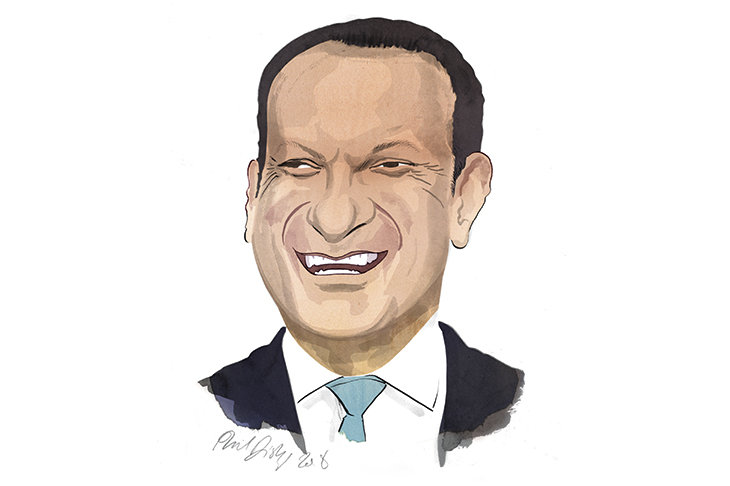How did we get into this Brexit mess? Why is it proving so difficult to leave the EU? Was it Theresa May’s botched 2017 election, which vaporized her Commons majority? Or perhaps her general incompetence and lack of vision?
How about the fierce determination of Europhile civil servants to save stupid Leave voters from themselves, cooking up a half-in-half-out withdrawal guaranteed to split the Tories?
Maybe it was the cynical ambivalence of HM’s Opposition, with Labour simultaneously backing both Brexit and a second referendum, having always intended to cause chaos and spark a general election by voting down the UK’s exit, contradicting its own manifesto? Then there’s the relentless big business lobbying, with corporate vested interests determined to keep Britain behind the EU’s protectionist wall and smaller rivals ensnared in Brussels’s red tape.
I’d say all of the above. While the case for being outside the EU still stands, the process of Brexit has been crippled by a combination of home-grown shortcomings: weak leadership, venal party politics, anti–democratic mandarins and an overwhelmingly Remain-supporting media class. This damaging Brexit impasse, though, has been caused not only by British incompetence. A mighty contribution has also come from Dublin.
When it comes to Brexit, the Republic of Ireland has much to lose. If the UK and EU fail to strike a withdrawal agreement, and Britain leaves with no deal, the Irish economy will suffer. Yet by wildly over-playing his hand, teaming up with Brussels to adopt a maximalist, ultra-legalistic approach to the Irish border, Taoiseach Leo Varadkar has made that outcome far more likely.
Having grown up ‘London Irish’ in the 1970s and 1980s, I feel in my bones the fragility of relations between the two countries that define my ethnicity. As such, the 1998 Good Friday Agreement and subsequent Anglo-Irish rapprochement have been a source of much personal relief to me and millions of other Irish exiles born and raised in Britain. I also fully understand Brexit is a serious irritation in the land of my fathers.
Being in the EU always meant far more to Ireland than the UK. Joining in 1973, along with Britain but on equal terms, was an enormous step. The Irish Republic, a mere quarter-century on from formal independence, was finally able to represent itself on the world stage. It has been this escape from the stultifying ‘Brit’ dominance that makes EU membership central to modern Ireland’s identity.
That’s why Brexit causes such Irish unease now. It renews the gnawing sense that Ireland is yet again set to suffer from the seemingly thoughtless, oppressive actions of its much bigger neighbor.
Economically, the Republic of Ireland remains closely linked to Britain. The UK accounts for €1 billion of Irish trade each week and one in ten jobs. Around 55 per cent of Irish exports of timber and construction materials are sold in Britain, along with 50 per cent of beef exports and 45 per cent of all food and drink sold abroad.
In purely practical terms, four-fifths of the Republic’s exports use the UK as a ‘land bridge’, crossing the Irish Sea, then traveling by road across Britain before leaving southern and eastern ports, headed for the EU and global markets. To say Brexit could be an inconvenience for the Republic if no UK-EU deal is signed is an understatement.
Yet Britain voted to leave. That’s why, after the 2016 referendum, the then Taoiseach Enda Kenny created joint committees of Irish and British civil servants to resolve cross-border issues. This was seen at the time as uncontroversial. In May’s Lancaster House speech, she said Britain was leaving the customs union and, for months afterwards, no one raised Irish border issues.
It was only in June 2017, when May lost her majority, becoming reliant on the DUP, and Varadkar replaced Kenny, that the Irish border hit the headlines. Brussels then saw an opportunity to raise the political stakes by asserting the ‘impossibility’ of avoiding ‘a hard border’ unless Britain stayed in the customs union. That prevents the UK signing trade deals with the rest of the world, of course, while compelling us to keep sending Brussels billions of pounds each year under the EU’s common external tariff.
Since then, Dublin has danced religiously to the EU’s tune. Varadkar disbanded Kenny’s working groups and cranked up the rhetoric, claiming that Brexit threatened the Good Friday Agreement. Many of those responsible for that precious treaty robustly dismiss such claims. ‘This is scaremongering. I do not see a connection between this process and peace in Northern Ireland,’ said Lord Trimble, Northern Ireland’s former first minister, who won the Nobel prize for his efforts in securing peace in Ulster.
‘EU negotiators have been rigid and intransigent to the point of being obstructive — and I’m sorry to say the government of the Republic has thrown itself in line with that,’ said Lord Carswell, Lord Chief Justice of Northern Ireland when the 1998 agreement was signed.
Ray Bassett, a former senior Irish diplomat, agrees the question of the Irish border is ‘essentially political’ in nature. ‘This emotive issue has been used as a weapon by those wanting to thwart Brexit — not least Michel Barnier,’ he said. ‘But Varadkar, too, has pursued a high-risk strategy which could backfire badly, given that Britain is vital to Irish economic interests.’
Varadkar leads a minority government in need of support from Irish nationalists. He has an incentive to make the Brits sweat. But the fact is that the head of HMRC, and his Irish counterpart, have both said there is no need for any additional physical infrastructure on the Irish border. Just last week, two of the world’s leading customs experts told the Commons Northern Ireland Select Committee this, insisting we can rely on existing technology, trusted trader schemes and behind-the-border checks.
By changing the constitutional status of Northern Ireland without Ulster’s consent, it’s the EU’s ghastly withdrawal agreement that could upend the Good Friday Agreement, not minor changes to the administration of Ireland’s somewhat limited cross-border trade.
Britain’s political class has screwed up Brexit — yes. But its Irish counterpart, ironically, has forgotten the importance of sovereignty, democracy and self-determination.
This article was originally published in The Spectator magazine.


















